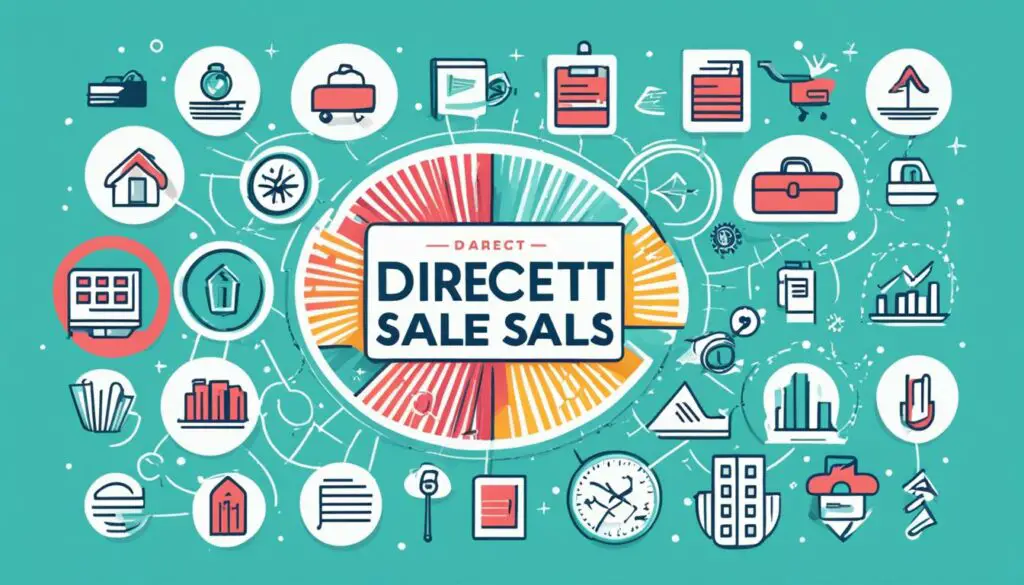Direct sales and network marketing are two business models that are frequently discussed and compared. While these terms are often used interchangeably, they are not exactly the same. In this guide, we will explore the differences between direct sales and network marketing, and discuss the pros and cons of each.
Direct sales involves selling products directly to consumers, without any intermediaries. This can be done through various methods such as in-person sales, online platforms, or home parties. On the other hand, network marketing typically involves a tiered structure, where independent sellers not only sell products but also recruit others to join the business. These recruits then become part of the seller’s network and contribute to their earning potential.
It’s important to note that network marketing is often used as another term for multi-level marketing (MLM). While all MLMs are network marketing businesses, not all network marketing businesses are MLMs. The key distinction is the presence of a tiered salesforce in MLMs.
Throughout this guide, we will delve deeper into the definitions and characteristics of direct sales, MLM, and network marketing, highlight their key differences, and discuss the pros and cons of each model. By the end, you will have a comprehensive understanding of these business models and be better equipped to evaluate which one may be the right fit for you.
Key Takeaways:
- Direct sales and network marketing are related but distinct business models.
- Direct sales involve selling products directly to consumers, while network marketing includes a tiered structure of independent sellers and their recruits.
- Network marketing is often used interchangeably with multi-level marketing (MLM).
- Pros and cons exist for both direct sales and network marketing, and it’s important to assess your own goals and preferences before choosing a path.
- Evaluating income potential and researching reputable companies is essential before getting involved in either direct sales or network marketing.
What is Direct Selling?
Direct selling is a dynamic industry that encompasses various companies and business models. At its core, direct selling involves the direct sale of products or services to consumers without intermediaries. This approach allows companies to establish a direct connection with their customers and provide personalized experiences.
Direct selling companies can adopt different structures, including both single-level and multi-level marketing (MLM). While single-level marketing focuses on individual sales representatives who earn commissions based on their personal sales, MLM introduces a tiered structure where representatives can earn income not only from their sales but also from the sales of their recruits and their recruits’ recruits.
The concept of direct selling is best captured by the definition provided by the Merriam-Webster dictionary, which states that direct selling is “the selling by a manufacturer, producer, or agent to someone other than a wholesaler or intermediary: selling directly to a consumer.” This definition emphasizes the absence of intermediaries and the direct connection between the company and the end consumer.
To give you a clear understanding of direct selling, here is an illustrative example showcasing some prominent direct selling companies:
| Company | Description |
|---|---|
| Avon | Avon is a well-known direct selling company that offers a wide range of beauty products through its network of independent sales representatives. |
| Tupperware | Tupperware utilizes the direct selling model to distribute its high-quality food storage and kitchen products. Independent consultants host virtual or in-home parties, demonstrating the benefits of Tupperware products to potential customers. |
| Amway | Amway is a global direct selling company that provides a diverse range of products, including health and wellness, beauty, and homecare items through its extensive network of distributors. |
Direct selling companies like these allow individuals to start their own businesses, offering flexibility and the opportunity to earn income based on their efforts. By eliminating traditional retail channels, direct selling companies can maintain a personal touch and build strong relationships with their customers.
What is Multi-Level Marketing (MLM)?
Multi-level marketing, or MLM, is a unique business structure that offers individuals the opportunity to earn income through direct sales and by building a sales team. In MLM, distributors not only earn commissions from their own sales but also from the sales generated by their recruits and the recruits of their recruits, forming a tiered structure.
MLM is a specific type of direct selling, but not all direct selling companies operate under the MLM model. The key distinction lies in the presence of a tiered salesforce, where distributors have the ability to earn income from the efforts of others within their organization.
Benefits of MLM
- Ability to leverage the efforts of others to increase sales and earnings
- Potential for residual income through the ongoing sales of a sales team
- Opportunity for personal and professional growth through leadership development
Challenges of MLM
- Requires a strong recruitment and mentoring strategy to build a successful team
- Can be time-consuming and requires dedication and perseverance
- Reputation concerns due to the association of pyramid schemes with MLM
While MLM can offer lucrative earning potential and the opportunity for business growth, it is essential to carefully research and select MLM companies that are reputable and align with personal values and goals.
| Key Features | Direct Selling | Multi-Level Marketing (MLM) |
|---|---|---|
| Income Structure | Commissions from personal sales | Commissions from personal sales and sales by recruits and their recruits |
| Salesforce Structure | Single-level, no tiered structure | Tiered structure with independent sellers and recruits forming “levels” |
| Earning Potential | Dependent on personal sales volume | Potential for higher earnings through team building and sales network |
| Recruitment | No emphasis on recruitment. Focused on individual sales | Recruiting new distributors is encouraged and incentivized |
What is Network Marketing?
Network marketing, also known as multi-level marketing (MLM), is a business model where independent distributors promote and sell products or services directly to consumers. These distributors not only earn commissions from their own sales but also from the sales made by the recruits they bring into the network. The terms “network marketing” and “MLM” are often used interchangeably, as they represent the same type of business structure.
While some suggest that network marketing may have a greater emphasis on building customer relationships compared to MLM, there is no concrete evidence supporting this claim. Both network marketing and MLM companies rely on a network of distributors to generate sales and recruit new members.
Network marketing companies offer a wide range of products and services, including health and wellness products, cosmetics, household goods, and financial services. These companies often provide training, support, and marketing materials to help their distributors succeed in selling the products and building their networks.
Now, let’s take a closer look at the differences between network marketing and direct selling in the table below:
| Network Marketing | Direct Selling |
|---|---|
| Involves a network of distributors who earn commissions from sales made by themselves and their recruits | Involves selling products directly to consumers without the recruitment aspect |
| Focuses on building relationships and expanding the network of distributors | Relies on personal selling and direct interaction with consumers |
| Offers the potential for passive income through downline sales | Does not involve earning income from recruits |
| Enables distributors to leverage the efforts of their team to generate income | Relies solely on individual sales efforts |
What is a Party Plan Company?
A party plan company is a direct selling business that utilizes parties, either in person or online, to market and sell products. Parties are hosted by individuals, often customers, who assist in facilitating sales. This unique sales approach combines the excitement and social nature of parties with the opportunity to showcase and demonstrate products to a captive audience.
In a party plan company, the host invites friends, family, and acquaintances to the party, where a representative presents the products and provides information on their features, benefits, and uses. Guests have the opportunity to see the products up close, ask questions, and make purchases. Often, the host is rewarded with free or discounted products based on the sales generated at the party.
Party plans have traditionally been seen as distinct from MLMs (multi-level marketing) due to differences in compensation structure and approach. However, in recent years, the line between party plans and MLMs has started to blur as MLMs adopt more customer-focused strategies and party plans incorporate MLM-style compensation elements.
Party Plan vs Network Marketing
While party plan companies and network marketing (another term for MLM) both involve direct selling, there are some differences between the two.
In a party plan company, the emphasis is on creating a fun and social atmosphere through parties, where customers can experience the products firsthand. The representative acts as a host, guiding guests through the product line and facilitating sales. Compensation in party plan companies is often based on a percentage of sales made at the party, with additional bonuses or rewards for achieving certain sales milestones.
On the other hand, network marketing focuses on building a network of distributors, who then recruit and train their own teams of distributors. The emphasis is on building a downline and earning commissions from the sales made by oneself and the recruits. Compensation in network marketing is typically structured as a percentage of the sales made by the distributor’s entire team.
While the distinction between party plan companies and MLMs is becoming less clear, party plan companies still maintain a strong emphasis on hosting parties and providing a personal touch to the sales process. This approach can be particularly effective for products that benefit from demonstration, explanation, or a personal connection to the seller.
Direct Sales vs MLM: Key Differences
When comparing direct sales and multi-level marketing (MLM), it’s important to understand the key differences between the two salesforce structures. While both involve selling products directly to consumers, they have distinct characteristics that set them apart.
Direct sales companies typically operate with multiple levels of distributors. These distributors sell products directly to consumers without a tiered structure. Each distributor is responsible for their own sales and may have their own team of sales representatives, but the focus remains on individual sales efforts. Examples of direct sales companies include Avon, Tupperware, and Mary Kay.
On the other hand, MLMs have a tiered structure where independent sellers, often referred to as distributors, recruit and build their own teams of sales representatives. These recruits form additional levels within the MLM, creating a hierarchical salesforce. Commissions and bonuses are often earned not only from direct sales but also from the sales made by recruits and their recruits’ recruits. This recruitment aspect sets MLMs apart from traditional direct sales companies. Amway, Herbalife, and Nu Skin are examples of MLM companies.
Key Differences between Direct Sales and MLM
- Organizational Structure: Direct sales companies have multiple levels of distributors, while MLMs have a tiered structure with independent sellers and their recruits forming additional levels.
- Focus: Direct sales companies prioritize individual sales efforts, while MLMs emphasize both individual sales and recruitment.
- Compensation: Direct sales representatives typically earn commissions based solely on their personal sales, while MLM representatives can earn commissions from their personal sales as well as the sales made by their recruits.
- Recruitment: Direct sales companies may encourage recruitment of new distributors, but it is not a central aspect of their business model. In MLMs, recruitment is essential for building a successful team and maximizing earnings.
To better visualize the differences between direct sales and MLM, refer to the table below:
| Direct Sales | MLM |
|---|---|
| Multiple levels of distributors | Tiered structure with independent sellers and recruits forming additional levels |
| Emphasizes individual sales efforts | Emphasizes both individual sales and recruitment |
| Commissions based solely on personal sales | Commissions earned from personal sales and the sales made by recruits |
| Recruitment encouraged but not central to the business model | Recruitment essential for building a successful team and maximizing earnings |
By understanding these key differences, individuals can make informed decisions about their involvement in direct sales or MLM opportunities. It’s important to carefully evaluate the business model, compensation plan, and support provided by the company before making a commitment.
Pros and Cons of Direct Sales
Direct sales offers several advantages that make it an attractive business opportunity.
- Low risks and low initial investment: Direct sales typically require minimal upfront costs, making it accessible to individuals with limited financial resources.
- Flexible working hours: As a direct seller, you have the freedom to choose when and how much you want to work, allowing for a more flexible lifestyle.
- Potential for earning extra income: Direct sales offer the potential to generate additional income, especially for those who are dedicated and motivated.
However, it is important to consider the potential downsides of direct sales before diving into the industry.
- Minimal average earnings: While some individuals achieve significant success in direct sales, the average earnings tend to be on the lower side. It requires consistent effort and skill to generate substantial income.
- Reliance on personal relationships for sales: Direct sales often involve leveraging personal networks for sales, which can be challenging for individuals with limited connections or who are uncomfortable with this approach.
- Potential startup costs for inventory or training: Depending on the company, there may be initial expenses for purchasing inventory or training materials, which could impact profitability in the early stages.

Despite these potential drawbacks, direct sales can be a rewarding venture for individuals who are self-motivated, enjoy building relationships, and are willing to put in the necessary effort to succeed.
Pros and Cons of MLM
Multi-Level Marketing (MLM) offers several advantages and disadvantages for individuals who choose to participate in this business model.
Advantages of MLM
1. Higher Earnings Potential: One of the main benefits of MLM is the opportunity to earn higher income by recruiting others and building a team. As your team grows and generates sales, you can earn commissions from their sales as well.
2. Business Skills Development: MLM provides a platform for individuals to develop valuable business skills such as sales, marketing, leadership, and team management. These skills can be transferred to other areas of life and contribute to personal and professional growth.
3. Flexible Income Options: MLM offers flexibility in terms of working hours and income potential. You can choose to work part-time or full-time, depending on your schedule and goals. This flexibility allows individuals to earn additional income or even replace their full-time job.
Disadvantages of MLM
1. Risk of Illegal Pyramid Schemes: The structure of MLM can sometimes blur the lines between legitimate MLM companies and illegal pyramid schemes. It is essential to carefully research and evaluate the legitimacy and compliance of MLM opportunities to avoid getting involved in illegal schemes.
2. Emphasis on Recruitment: Some MLM companies focus more on recruiting new members rather than selling actual products. This emphasis on recruitment may lead to a lack of focus on quality products and genuine customer satisfaction.
3. Potential for Low Earnings: While MLM offers the potential for higher earnings, it is important to note that not all MLM participants achieve significant success. Many individuals may experience low earnings or even financial losses, especially if they are unable to build a successful team or generate significant sales volume.
Direct Sales vs Network Marketing: Income Potential
When considering a career in direct sales or network marketing, it’s essential to evaluate the income potential associated with each industry. While some individuals can achieve significant earnings in both direct sales and network marketing, it’s crucial to understand the reality of income statistics.
According to available data, the majority of direct sellers and MLM representatives make less than $600 per year. This highlights the importance of managing expectations and understanding the earning potential within these industries. Additionally, a significant percentage of MLM participants actually experience financial losses rather than profits.
Aspiring direct sellers and network marketers should carefully consider the income potential before joining either industry. It’s advisable to conduct thorough research, consult with experienced professionals, and assess personal motivations and financial goals to make an informed decision.
| Average Income Potential | Advantages | Disadvantages | |
|---|---|---|---|
| Direct Sales | Less than $600 per year for the majority |
|
|
| Network Marketing | Less than $600 per year for the majority |
|
|
Conclusion
In conclusion, the direct sales and network marketing industries offer individuals the opportunity to sell products directly to consumers. While network marketing includes a tiered sales structure known as MLM, both models have their advantages and disadvantages. Pros of direct sales include low startup costs and flexible working hours, but potential earnings can be limited. On the other hand, MLM offers the potential for higher earnings through recruitment and team building, but there are risks involved, such as the focus on recruitment rather than product sales.
To make an informed decision about joining either industry, it is essential to thoroughly research and evaluate income potential. While some individuals achieve significant success in both direct sales and network marketing, the majority earn less than $600 per year. Additionally, a significant number of MLM participants may even experience financial loss. It is crucial to carefully consider these factors and weigh the pros and cons before venturing into direct sales or network marketing.
Ultimately, the choice between direct sales and network marketing depends on personal preferences, goals, and comfort with sales and recruitment. Both industries offer the potential for earning extra income and flexible work arrangements, but they also come with their own sets of challenges. By understanding the nuances and doing thorough research, individuals can make an informed decision and maximize their chances of success in either direct sales or network marketing.
FAQ
What is the difference between direct sales and network marketing?
Direct sales involves selling products directly to consumers, while network marketing includes a tiered structure of independent sellers and their recruits.
Is network marketing the same as multi-level marketing (MLM)?
Yes, network marketing is often used as another term for MLM.
What is direct selling?
Direct selling is the selling of products directly to consumers without intermediaries.
How does multi-level marketing (MLM) work?
MLM involves individuals earning commissions from direct sales and the sales made by their recruits and their recruits’ recruits, forming a tiered structure.
What is a party plan company?
A party plan company is a direct selling business that utilizes parties, either in person or online, to market and sell products.
What are the key differences between direct sales and MLM?
Direct sales companies typically have multiple levels of distributors, while MLMs have a tiered structure with independent sellers and their recruits forming “levels.”
What are the advantages of direct sales?
Some pros of direct sales include low initial investment, flexible working hours, and the potential for earning extra income.
What are the disadvantages of direct sales?
Some cons of direct sales include minimal average earnings, reliance on personal relationships for sales, and potential startup costs.
What are the advantages of MLM?
Some pros of MLM include the potential for higher earnings through recruiting others, the opportunity to learn business skills, and the ability to earn income on a part-time or full-time basis.
What are the disadvantages of MLM?
Some cons of MLM include the risk of getting involved in illegal pyramid schemes, the focus on recruitment rather than product sales in some MLMs, and the potential for low earnings.
What is the income potential in direct sales and network marketing?
While some individuals can earn substantial income in both direct sales and network marketing, the majority of representatives make less than $600 per year, and a significant percentage of MLM participants actually lose money.




